Traffic management: Where are the risks for online discrimination
Net neutrality is the principle that all the internet traffic is treated equally, without blocking or slowing down certain data. Net neutrality is crucial for fair competition between online services, for innovation, and for freedom of expression online.
The European Parliament has adopted a Regulation that includes provisions on net neutrality. Currently, the BEREC (the Body of European Regulators of Electronic Communications) is preparing the guidelines for how the Regulation should be implemented across Europe. From the citizen’s point of view, the guidelines need to be improved concerning traffic management.
Traffic management allows internet providers to manage data traffic on their networks. If the network is temporarily jammed, the available space needs to be used as efficiently as possible. Priority can be given to certain communications while slowing down others.
What if your provider gives priority to a video platform or TV channel that you don’t want to use, and leaves you unable to use your favourite platform or channel? What if the provider keeps claiming that the network is busy, and keeps slowing down the services you want to use?

Traffic management can be allowed if it is reasonable, transparent, non discriminatory and proportionate. It must be temporary – not a standard part of network configuration. Internet providers should of course be allowed to manage their networks, but this needs to be done in a way that makes no distinction on the basis of the content, application or services.
Traffic management must treat all applications and services equally. Exceptions should be made only in very limited circumstances.
To help BEREC to finalise their guidelines in a way that ensures that traffic management respects net neutrality, you can go to SaveTheInternet.eu and send BEREC a message that you want them to support a free, innovative open internet. The consultation is open until 18 July.

